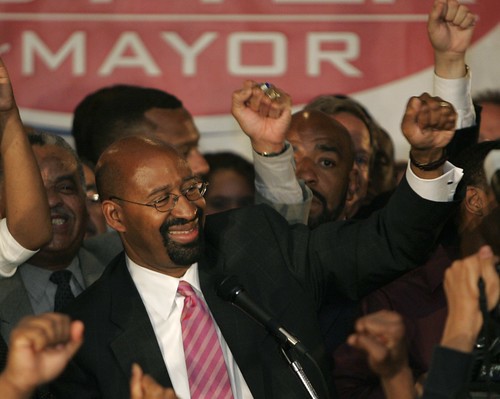
After the municipal election results came in on Nov. 8, students and professors speak their minds on the issues and the implications of the winners.
On Nov. 8, Philadelphia residents voted for the local officials who would be in charge of running the city. Voters elected the mayor, several judges, city commissioners, sheriff and register of wills.
The incumbent democratic candidate, Mayor Michael Nutter won the mayoral race.
David Wecht, a democrat, was elected the Pennsylvania Superior Court Judge.
Republican Anne Covey was elected Pennsylvania Commonwealth court judge.
City council districts 10, eight, six, five and two all elected its city council representatives. Brian O’Neill, a republican, won in the 10th district. District eight went to democrat Cindy Bass. Democrat Bobby Henon won in District six. Darrell Clark, a democrat, ran unopposed in the fifth district, which is where Main Campus is located. Kenyatta Johnson, a democrat, won in the second district.
The voters chose three City Commissioners and they are incumbents Stephanie Singer and Anthony Clark, both democrats, and a new face Al Schmidt, a republican.
Ron Donatucci, a democrat, won the register of wills position for the 40th year in a row. Jewel Williams, a democrat, was elected as the Sheriff of Philadelphia.
Erik Jacobs, the president of Temple Unviersity College Republicans, was enthusiastic about Schmidt’s ability to defeat the incumbent Joe Duda in the City Commissioner race.
“His election will make sure that elections in this city are run more fairly,” Jacobs said.
Jacobs said he believes that the City Commissioners’ office will be run much more efficiently with Schmidt in office, and that Schmidt has the ability to cut how much it costs to operate the office. He said he also believes in Schmidt’s ability to lessen voter registration fraud.
Dylan Morpurgo, a sophomore political science student, had many opinions about the results of the election.
“Most of the elections were already decided back in May from the primary, so no surprise on a lot of them,” Morpurgo said.
He added that he was excited about the Montgomery County Commissioners’ race because he said it “really shows how important Pennsylvania is going to be in 2012.”
The results for the Montgomery County Commissioner race were that each candidate’s votes were within 4 percent of each other.
Morpurgo said he also found the city commissioners’ race to be interesting. He said that there seems to be a grand notion of political unrest in the city. Morpurgo thought that the results show how fed up people were with the old way of doing things.
“It doesn’t matter which side of the fence you’re on,” Morpurgo said. “Everyone seems to think that we keep electing the same people to office and they aren’t getting anything done.”
He said he believes that the strong will to electing new blood into office was definitely displayed in the City Commissioners’ race.
The election that Morpurgo thinks will influence students the most is the election of Councilman Darrell Clark. He ran unopposed and Morpurgo said he believes that, compared to the other people that were elected, Clark is the most likely choice to be the next City Council President. Clark recently proposed a bill that would limit student housing around Temple.
“If he is really insistent on getting his bill passed he will have the power to do so,” Morpurgo said.
This bill will have direct impact on all current and future Temple students and therefore Clark being elected affects students.
Dr. James Rogers, an associate professor in the political science department, gave some insight into the impact that local officials have on college students. He said that the impact comes mostly as part of the general impact that they have on life in the city.
“The whole gamut of local policy would come into play there,” Rogers said.
The city of Philadelphia contributes to the budget of the community college, so there is a more substantial link there. As far as Temple is concerned, as well as other large universities, there would not be any significant impact.
Temple does, however, “look for cooperation with the city on a range of relatively small matters over time,” Rogers said.
The local elections this year brought with them both surprise defeats of incumbents as well as unsurprising reelections. While not every position that was elected has direct impact on students, all have some influence on what happens around the city in which Main Campus resides. Some positions do have direct impact and therefore the person who fills these positions is important to students.
Amanda Rossetti can be reached at amanda.rossetti@temple.edu.



Be the first to comment